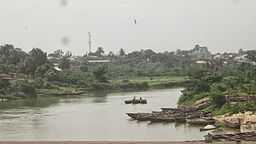Imo River
| Imo River Imo Mmiri | |
 Imo near Obigbo | |
| Name origin: Named after the Imo Mmiri alusi | |
| Country | Nigeria |
|---|---|
| Source | |
| - location | Okigwe, Imo State |
| - coordinates | 5°50′56″N 7°14′20″W / 5.84889°N 7.23889°W [1] |
| Mouth | Atlantic Ocean |
| - location | Eastern Obolo, Akwa Ibom State |
| - elevation | 0 ft (0 m) |
| - coordinates | 4°28′14″N 7°35′38″W / 4.47056°N 7.59389°WCoordinates: 4°28′14″N 7°35′38″W / 4.47056°N 7.59389°W |
| Length | 150 mi (241 km) [2] |
The Imo River (Igbo: Imo Mmiri) is in southeastern Nigeria and flows 240 kilometres (150 mi) into the Atlantic Ocean. Its estuary is around 40 kilometres (25 mi) wide,[3] and the river has an annual discharge of 4 cubic kilometres (1.0 cu mi)[4] with 26,000 hectares of wetland.[5] The Imo's tributary Rivers are the Otamiri and Oramirukwa.[6] The Imo was cleared under the British colonial administration of Nigeria in 1907–1908 and 1911; first to Aba and then to Udo near Umuahia.[7]
The deity, or Alusi of the river is the female Imo Mmiri who communities surrounding the river believe to be the owner of the river. A festival for the Alusi is held annually between May and July.[8] The Imo River features an 830-metre (2,720 ft) bridge at the crossing between Rivers State and Akwa Ibom.[9]
References
Notes:
- ↑ Afigbo, Adiele Eberechukwu (2005). Toyin Falola, ed. Nigerian history, politics and affairs: the collected essays of Adiele Afigbo. Africa World Press. p. 95. ISBN 1-59221-324-3.
- ↑ McNally, Rand (1980). Encyclopedia of World Rivers. Rand McNally. p. 14.
- ↑ Institut français d'Afrique noire (1976). Bulletin de l'Institut français d'Afrique noire. Niger Delta: IFAN. p. 29.
- ↑ Food and Agriculture Organization of the United Nations. Land and Water Development Division (1997). Irrigation potential in Africa. Food & Agriculture Org. p. 92. ISBN 92-5-103966-6.
- ↑ Russell, Nathan C. (1993). Sustainable Food Production in Sub-Saharan Africa: Constraints and opportunities. IITA. p. 57. ISBN 978-131-096-0.
- ↑ Simmers, Ian (1988). NATO, ed. Estimation of natural groundwater recharge. Springer. p. 436. ISBN 90-277-2632-9.
- ↑ Chuku, Gloria (2005). Igbo women and economic transformation in southeastern Nigeria, 1900-1960. Routledge. p. 152. ISBN 0-415-97210-8.
- ↑ Uzor, Peter Chiehiụra (2004). The traditional African concept of God and the Christian concept of God. Peter Lang. p. 310. ISBN 3-631-52145-6.
- ↑ The Report: Nigeria 2010. Oxford Business Group. p. 213. ISBN 1-907065-14-8.